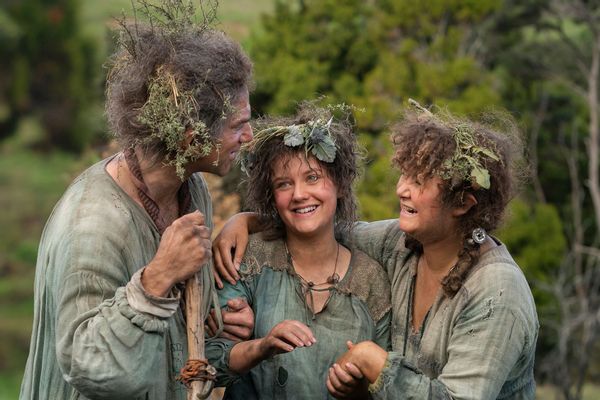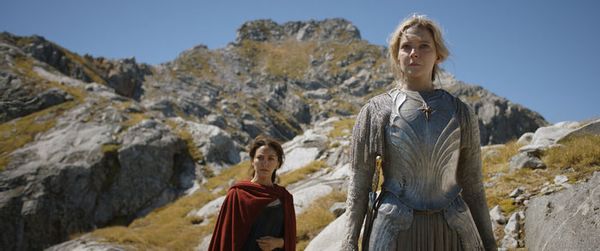
Good news, trolls! If "The Rings of Power" didn't give you enough fuel for hatred with its cast of color and women characters with agency who aren't victims of sexual violence all the time, here's something else for you to chew on: the series seems awfully concerned with a changing climate.
The "Lord of the Rings" prequel from Prime Video is set thousands of years before the J.R.R. Tolkien stories we know and love. One of the strengths of the new series is how it builds upon existing lore while adding its own rich narratives. Like, if smart fan fiction were given a $500 million budget. The Southlands isn't a place found in Tolkien's work specifically, but in Episode 7, titled "The Eye," "The Rings of Power" supplies a pretty compelling origin story for how Mordor got its boom. Most of the inhabitants of this world, save the evil ones, are preoccupied with the environment. They know something is off; they believe it's changing and unlike about 25% of Americans, they're ready to fight.
"The Rings of Power" follows several groups on disparate journeys bound to intersect. Elf hero Galadriel (Morfydd Clark) gave up her eternal reward because she can't shake the unsettling feeling that evil has not been vanquished. She's right, of course, and leads the charge of human soldiers to save the day (at first) when a Southlands village is besieged by orcs, led by the darkly intriguing Adar (Joseph Mawle). Meanwhile an elf who has a crush on her (doesn't everyone?), Elrond (Robert Aramayo), has rekindled his friendship with dwarf prince Durin (Owain Arthur) and the two are making headway on a forge. Hobbit ancestors, known as Harfoots, are making their annual migration, assisted by the mysterious Stranger (Daniel Weyman) who happens to be quite large and may or may not be truly helpful.

You would think a species who live infinitely longer than everyone else would be concerned about the destruction of the world, and you are correct.
Elves might also be the group that comes to mind when one thinks of Tolkien's creatures and the natural world. Their crowns are leaves. They're often pictured strolling amid groves of yellow birch trees. And the only thing that will save them? A precious metal known as mithril, which just so happens to be in the mines of the dwarves. The elves are endangered – specifically, the Light of the Eldar is fading out – and according to legend, mithril sounds a lot like the shiny power rumored to be the only thing that can restore them.
You would think a species who live infinitely longer than everyone else would be concerned about the destruction of the world, and you are correct. For the elves and for others, a yellow leaf from the Tree of Lindon serves as a litmus test, the canary (it's the right color) in the coal mine about their changing lands.

Evil comes first in the form of nature's destruction.
Mining doesn't sound especially environmentally conscious, but the dwarves are just as attuned to the underground as elves and Harfoots are to above. Their mining involves, as Disa explains, singing. Screenrant writes, "Dwarves use the resonance of their booming voices to detect where mineral lodes are located within the mountain," summing it up neatly as sonar. But for Disa and other dwarves, it's even more interconnected than that. She sings to the mountain when several miners are trapped. They're eventually freed. The mountains tell her where to dig, and crucially for the preservation of the natural world and everyone's way of life: "where to leave the mountain untouched."
Recent horror movies have mined, to put it terribly bluntly, the darkness of the extraction industry. 2021's "The Devil Below" is set in an Appalachian town abandoned after a coal mine fire. "Unearth" from 2020 straight up has the tagline: "A fracking horror story." Something lurks in the dwarves' mines too and digging too deep, as the elves fly too close to the sun, taking too much, will soon awaken it.

The land is forever changed, and a good part of Episode 7 finds some characters walking shell-shocked through an apocalyptic landscape: red skies as in a dust storm, falling ash as if from a wildfire. Evil comes first in the form of nature's destruction, a delicate balance of life upset, triggering cataclysmic chain reactions, because of the work of man (and orc).
Sound familiar? This piece will no doubt trigger an avalanche of unwanted emails and DMs from strange men, who love to hate this show with its elf and dwarf played by actors of color, and its women kicking ass. But as trolls conveniently forget the essential women characters in Tolkien's books – such as Éowyn, who when told by the Witch-king he cannot be killed by a living man, declares "But no living man am I!" a line slightly tweaked for Peter Jackson's film – they also skip over Tolkien's love of and concern for nature. It seeps through his work in loving descriptions of forests, from the woods of Lothlórien to Fangorn.
Part of the work of the orcs is razing trees, destroying nature in the service of the evil industry which chugs along like a locomotive. The line from "The Two Towers," which struck me as ominous even as a bookworm child, goes, "There is always smoke rising from Isengard these days." And there is also always a climate emergency in our world these days: a hundred year flood, a hurricane, smoke from more frequent and less distant fires. Our Earth does not have the stewards of Tolkien's Middle-earth, the wise and tragic Ents, those noble tree-giants who care for the woods, including walking and, as Nori knows, speaking.
In the first episode of "The Rings of Power," a burning meteor bearing The Stranger slashed through the sky. All the lands are linked, as all nature is, and the series showed each group of characters watching the blazing streak in the darkness: the Harfoots, the elves. In a leafy glen in a very small, beautiful moment, the trees watched too. They shifted, reached out branched arms to comfort each other. The trees know what's coming, even if we still refuse to.
"The Rings of Power" streams its season finale on Friday, Oct. 14 on Prime Video. Watch the trailer via YouTube.







